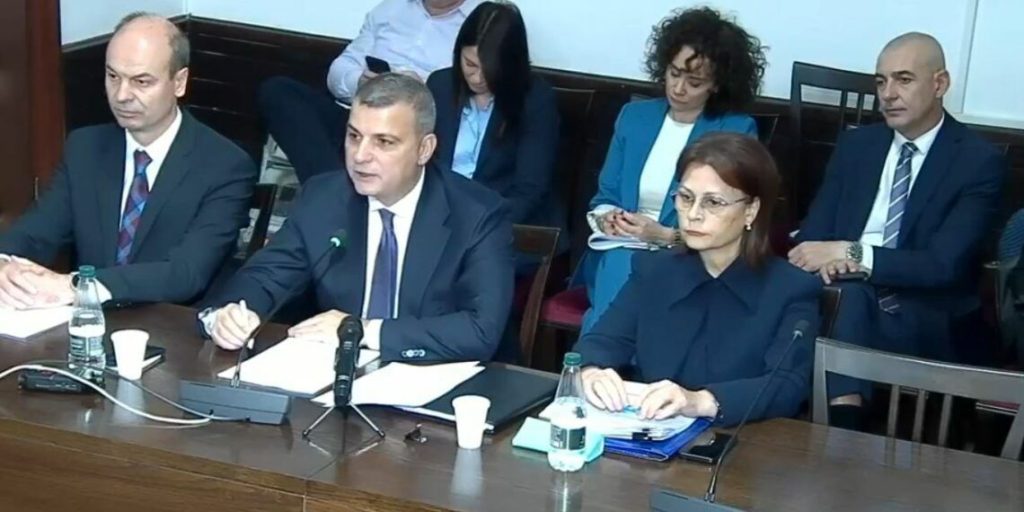
A rare and unsettling statement has emerged from Gent Sejko, Governor of the Bank of Albania, during his report before the Parliamentary Committee on Economy. Instead of presenting a calm and data-driven analysis of the country’s financial stability, Sejko delivered remarks that sounded more like a veiled warning than an institutional report. His words — “the independence of the Bank of Albania has been violated” — followed by the phrase “but I don’t want to elaborate,” have stirred intense speculation about political interference, hidden pressure, and the erosion of institutional autonomy in one of the country’s most crucial financial bodies.
“I Have Felt This Pressure Heavily, But I Don’t Want to Go Into Details”
During his presentation, Sejko stated openly that the Bank of Albania has been under continuous pressure over the past two years, which, according to him, has limited its ability to fully perform its constitutional functions.
“The independence of the Bank of Albania has been violated. The Bank is being asked for accountability that goes beyond its legal mandate. I have felt this pressure heavily, but I don’t want to go into details,” he said.
Such phrasing — emotionally charged, vague, and defensive — is highly unusual for a central bank governor. In every professional standard, it reads less like a financial report and more like a political statement — a coded message implying external influence, yet without naming those responsible.
Governor or Political Messenger?
In the realm of monetary policy, ambiguity is dangerous. Central banks are expected to project confidence, stability, and professionalism, not to stir uncertainty.
Sejko’s remarks, rather than clarifying the Bank’s challenges, have instead raised alarms about its internal independence and the possibility of political interference in monetary decision-making.
By choosing to speak in personal terms — “I have felt it,” “I don’t want to elaborate” — Sejko blurred the line between institutional reporting and political pressure, making the Bank appear both vulnerable and reactive.
Such language would be unthinkable in the European Central Bank or the Bank of England, where independence is defended through action and transparency, not through emotional public declarations.
The Silence That Speaks
Perhaps the most powerful — and worrying — part of Sejko’s statement is what he did not say. If the head of a central bank claims that independence has been violated but refuses to name who is responsible, that silence becomes an implicit admission that the institution’s integrity has been compromised.
In democratic systems, such a statement would trigger parliamentary hearings, media scrutiny, and calls for explanation. In Albania, it has instead sparked speculation: Is Sejko trying to signal internal conflict within the Bank, or is he using this statement as a form of pressure on the government ahead of upcoming economic decisions?
The Risk of Shaken Credibility
The credibility of a central bank depends entirely on trust — from citizens, investors, and international partners. Any suggestion of political influence can destabilize that trust. Sejko’s remarks, by their very nature, invite uncertainty into financial markets.
For a small and vulnerable economy like Albania’s, even the perception of a politically pressured central bank can have repercussions on interest rates, investor confidence, and currency stability.
What exactly did Gent Sejko say?
He declared that the independence of the Bank of Albania has been violated and that the institution has faced continuous pressure over the past two years, but refused to give further details.
Why is this statement important?
Because it comes from a figure whose role is to guarantee financial stability and institutional independence. Such words suggest possible political interference at the highest levels.
Was this a professional statement?
No. By speaking vaguely about “pressure” without clarification, Sejko delivered a non-professional and emotionally charged message, interpreted by many as a form of institutional blackmail.
What happens next?
The Parliamentary Committee on Economy is expected to request clarification, and Sejko may be called again to present concrete evidence or clarify whether his remarks were meant as a political signal or a personal complaint.
In the end, Gent Sejko’s silence may speak louder than his words. His refusal to elaborate has turned a technical hearing into a national controversy, one that raises a fundamental question:
If the Governor of the Bank of Albania feels pressured — who is really running the country’s monetary system?
